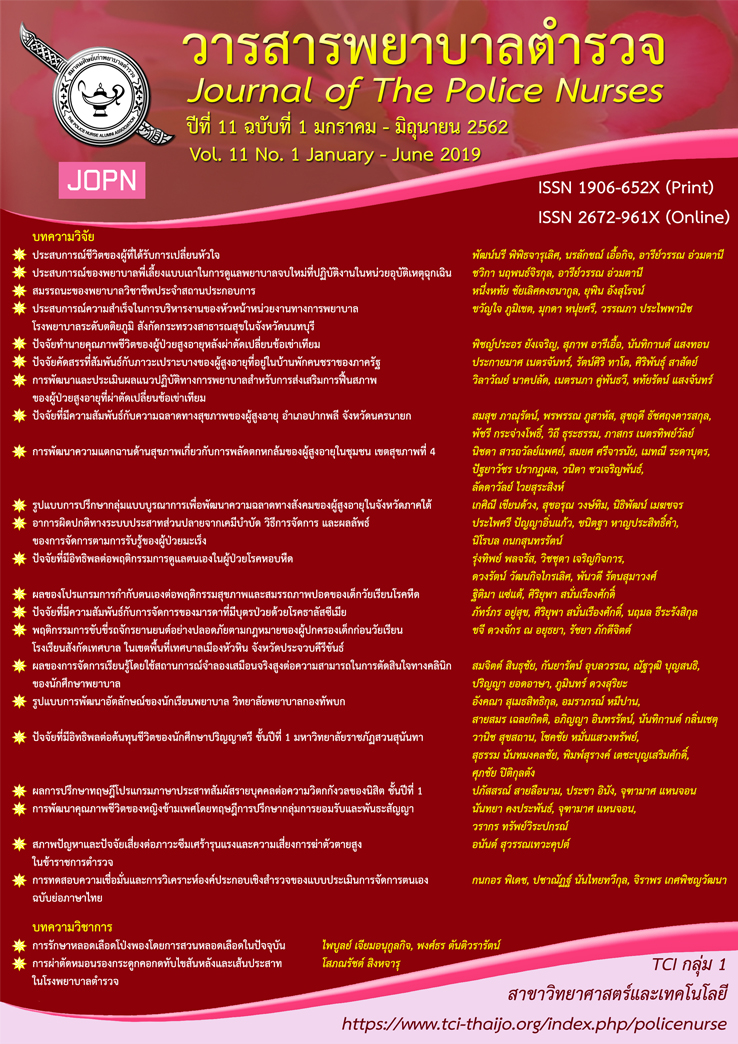EXPERIENCES OF A TEAM MENTOR MENTORING NEWLY GRADUATED NURSES WORKING IN EMERGENCY ROOM
Keywords:
a team mentor, newly graduated nurses, emergency roomAbstract
The purpose of this study was to describe experiences of a team mentor, mentoring newly graduate nurses working in the Emergency Room. The qualitative research methodology Heidegger’s interpretative phenomenology was used. Ten professional nurses with at least two years experiences with a team mentor were willing to participate in the study. Data was collected using in-depth interviews, voice recordings, field notes and observations. The data were transcribed verbatim and then analyzed using the interpretative method proposed by van Manen. The findings regarding experiences with a team mentor could be categorized into 7 themes as follows 1) assigning a team 2) team leader lecturing academic contents, 3) teaching on-site from actual experiences, 4) practicing good manners, 5) supervising, 6) problem-solving and counseling, and 7) evaluating work performance. The study findings have enabled the researcher to understand the professional nurses who work as the team mentors in training newly graduate nurses. The nursing administrators should be able to apply the work of team mentors in other sectors in order to enable all professional nurses to take part in supervising newly graduate nurses.
Downloads
References
Benner, P. E. (2001). From novice to expert: excellence and power in clinical nursing practice. Upper Saddle River, N.J.: Prentice Hall.
Boonyanurak, P. (2003). Wisdom in nursing science. Bangkok: Rama 4 printing.
Caldwell, J., Dodd, K., & Wilkes, C. (2008). Developing a team mentoring model. Nursing Standard, 23(7), 35-39.
Duchscher, J. B. (2008). A process of becoming: The stages of new nursing graduate professional role transition. Journal of Continuing Education in Nursing, 39(10), 441-450.
Komaratat, S. (2006). The effect of using mentorship model on nursing competency of new graduated nurses (thesis master of nursing science). Faculty of Nursing, Chulalongkorn university, Bangkok.
Morton-Cooper, A., & Palmer, A. (2000). Mentoring, preceptorship and clinical supervision (2nd ed.). London: Blackwell Scientific Publication.
Lueboontawatchai, O. (2000). Critical thinking: Nursing teaching. Bangkok: Thana place and graphic.
Oumtanee, A, (2010). Qualitative research in nursing (2nd ed.). Bangkok: Chulalongkorn university printing house.
Prousoontorn, M. (2007). Experiences of mentorship of professional nurses in a government university hospital (thesis master of nursing science). Faculty of Nursing, Chulalongkorn university, Bangkok.
Prueksapitikul, S. (2012). Hospital management to excellence with TQA. Bangkok: Bhappim.
Sanbudda, T. (2003). Working experience of new graduated nurses in a general hospital (thesis master of nursing science). Faculty of Nursing, Chulalongkorn university, Phayathai.
Smith, L. S., McAllister, L. E., & Crawford, C. S. (2001). Mentoring benefits and issues for public health nurses. Public Health Nursing 18(2), 101-107.
Srisatidnarakul, B. (2008). Leadership and management strategies in the 21st century (2nd ed.). Bangkok: Chulalongkorn university printing house.
Srisookvong, S. (2009). Management: From the executive's viewpoint (5th ed.). Bangkok: Faculty of Commerce and Accountancy, Chulalongkorn university.
Sriyanalak, N. (2011). Nursing administration (4th ed.). Nontaburi: Academic welfare program.
Tinio, R. G. (2012). Outcomes of mentoring interventions for new graduate nurses (thesis for the degree of doctor of philosophy in nursing science). University of Illinois, Chicaco.
van Manen, M. (1990). Researching lived experience: human science for an action sensitive pedagogy. London: The Althouse Press.
Woodworth, J. (2012). A group orientation model for new graduate nurses. Journal for Nurses Staff Development 28(5), 219-221.
Downloads
Published
How to Cite
Issue
Section
License
ผลงานที่ได้ตีพิมพ์แล้วจะเป็นลิขสิทธิ์ของวารสารพยาบาลตำรวจ















